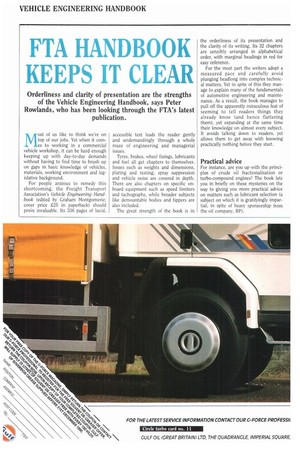FTA HAN IBOOK KEEPS IT CLEAR
Page 112

If you've noticed an error in this article please click here to report it so we can fix it.
most of us like to think we're on top of our jobs. Yet when it comes to working in a commercial vehicle workshop, it can be hard enough keeping up with day-to-day demands without having to find time to brush up on gaps in basic knowledge of vehicles, materials, working environment and legislative background.
For people anxious to remedy this shortcoming, the Freight Transport Association's Vehicle Engineering Handbook (edited by Graham Montgomerie; cover price £25 in paperback) should proire invaluable. Its 336 pages of lucid.
accessible text leads the reader gently and undemandingly through a whole maze of engineering and managerial issues.
Tyres, brakes, wheel fixings, lubricants and fuel all get chapters to themselves. Issues such as weights and dimensions, plating and testing, spray suppression and vehicle noise are covered in depth. There are also chapters on specific onboard equipment such as speed limiters and tachographs, while broader subjects like demountable bodies and tippers are also included.
The great strength of the book is in the orderliness of its presentation and the clarity of its writing. Its 32 chapters are sensibly arranged in alphabetical order, with marginal headings in red for easy reference.
For the most part the writers adopt a measured pace and carefully avoid plunging headlong into complex technical matters. Yet in spite of this they manage to ,explain many of the fundamentals of automotive engineering and maintenance. As a result, the book manages to pull off the apparently miraculous feat of seeming to tell readers things they already know (and hence flattering them), yet expanding at the same lime their knowledge on almost every subject. It avoids talking down to readers, yet allows them to get away with knowing practically nothing before they start.
For instance, are you up with the principle.s of crude oil fractionalisation or turbo-compound engines? The book lets you in briefly on these mysteries on the way to giving you more practical advice on matters such as lubricant selection (a subject on which it is gratifyingly impartial, in spite of heavy sponsorship from the oil company, 811.
























































































































